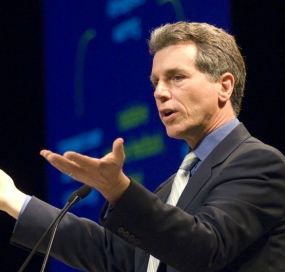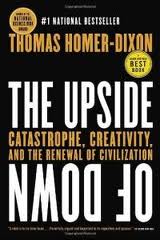
Only those timid souls who have buried their heads deep in the sands of time can be unaware of the unsettling political, economic and environmental developments around the globe. Having just crossed the threshold from 2019 to 2020, many of us are wondering what we might encounter in this new year and new decade. Political leaders everywhere are more focused on retaining or gaining power than on dealing effectively with issues that threaten to disturb the present world order. In 1968 when Mary Hopkin sang the words “those were the days my friend, we thought they’d never end,” she aptly described the time in which we now live.
Hoping for a glimpse into the obscure future looming before us, I turned to University of Toronto professor, Thomas Homer-Dixon’s observations in “The Upside of Down”. He contends there are a number of stresses simultaneously converging on an increasingly maligned earth. Among these are global warming, population imbalance, energy scarcity and the growing gulf between rich and poor. Because they are coming at us simultaneously, he says, we no longer have the luxury of responding to them one at a time. “Surprise, instability and extraordinary change will be regular features of our lives,” he suggests, then adds, “the reliable landmarks of life will become strange and distorted.”

Writing in the early years of this century he asks, “Thirty years ago, who would have anticipated the implosion of Soviet Communism, the widespread adoption of personal computers, emergence of AIDS, opening of a gaping hole in the stratospheric ozone layer over the Arctic, or airplanes flying into the World Trade Centre?”
To this list we could now add the increasing indiscriminate violence of terrorists, the rampaging wild fires currently ravaging vast tracts of Australia, and the continuing loss of forests. There is also concern about instability of the North American electrical grid, impact of global warming on polar bears, and dangerous levels of air pollution, especially in India and China. Having lived in Abbotsford many years, I know how polluted air impacts health and enjoyment of life. Even though we may be anxious about the desecration of the planet, we seem unwilling to alter our destructive ways.
I became acutely aware of this human resistance to change when I worked with prison inmates. Corky was a prime example. Stocky, barrel chested with a shiny bald pate, he faced life with arms crossed. He resisted all attempts to divert him from his heroin dependent, small time law flaunting criminal persona. He would not, or possibly could not, change his thinking. Corky viewed life through a cynical soul destroying prism. Out on parole, he stopped at a bar in Princeton one evening, then drove his car off the highway into a deep ravine. He was confined to a wheelchair until he suffered a massive, life ending stroke a dozen years later. His inability to adopt a more optimistic outlook invited disaster into his personal life.
Unless many of us become willing to view our circumstances through a less selfish, less self-centered lens, we too could face calamity. Increasingly, observers of world wide trends are warning us we’re drawing ever nearer to an abyss of calamitous events. We are already faulting our government for the various ailments festering in our country. We need to recognize, though, that politicians alone cannot derail our society’s progression toward a chaotic future.
Although on a global scale there is much that we in the Similkameen Valley cannot remedy, we can do things in our back yards and our communities. Denial of reality or responsibility is not an adequate or acceptable response. In the realms of environment, pollution and climate change we can take measures to decrease our personal footprint on Mother Earth.
Where do we begin? Homer-Dixon says that to rescue our planet from further degradation, men and women with courage and good sense will need to take action. In a world of relentless change and surprise, he suggests we must constantly re-invent ourselves, our society and our future. We must be willing to grapple with complacency and our inclination to shrug off tinges of guilt.
Corky resisted self-change, at great cost to himself. To this time we’ve been blessed with many good years. Let’s not assume they will never end. It’s essential that as individuals we challenge our thinking and look for ways to protect our little corner of the planet.
